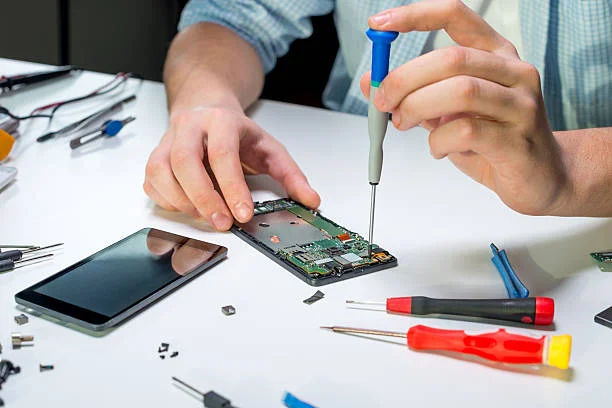Cellular Master Technician
Course Overview
A Cellular Master Technician (CMT) is a highly skilled professional who specializes in repairing and maintaining cellular devices, such as smartphones and tablets. Becoming a Cellular Master Technician can be a rewarding career, especially with the increasing reliance on mobile devices.
Prerequisites: Students should have at least a high school diploma or GED.
One month (95 hours) of a long professional course.
Course Curriculum
Diagnosis & assembly procedures
Common symptoms to properly diagnose repairs
Identify the difference between hardware and software issues
Identify the purpose of different tools and peripherals
Different disassemble procedures through heat removal, high pressure or screw assembly
Identify basic part functions and how to replace them, including microphones, cameras, sim and memory card readers, loudspeakers, audio speakers, headphone jack, charging port flex cable, and Wi-Fi antennas.
Differentiate between variety of adhesives
Knowledge of power supply
Dent repairs on housings (iPhone)
Reassemble procedures
Vendor referral for inventory
Learn how to calculate proper profit margins
- Disassemble the iPhone series (4 to the new 7 Plus models) of phones correctly
- Disassemble the iPad and iPad Mini
- Python History
- Python key features
- Python syntax
- Getting started with python programming
Learn how to troubleshoot software and programming errors, remove passwords, and unlock devices.
Apple
iTunes errors
Identify when a phone has been blocked by the provider due to theft or non-payment
Restore system
Networks unlock
Password removal
Schematic software
Android
Troubleshoot software issues
Restore system
Hard reset and soft reset
Password removal
Network unlock
How to use unlocking equipment
Back up data
Identify when a phone has been blocked by the provider due to theft or non-payment
Configure Internet settings
Learn how to identify corrosion and apply different cleaning techniques.
Identify exterior and interior corrosion
Successfully execute different cleaning methods
Knowledge on corrosion removal equipment
How to remove the motherboard plaque in order to remove water damage
Tools and chemicals used to remove corrosion
Learn how to replace screens, including assembly, glass and LCD. You will learn how to refurbish broken screens and bring them back to their original state using the OCA method.
LCD AND GLASS REPLACEMENT
Change touchscreen digitizers with heat removal, high pressure or screw assembly
Test device properly before assembly
Techniques to prevent fingerprints and dust on display image
Identify which adhesive to use on each device
How to identify different types of frames on Samsung Galaxy devices in order to replace the screen
Techniques to repair dents on frames of iPhones and iPads This is done in order to properly install and prevent damage during the installation of the screen. Failure to do this can cause the screen to unglue or to crack.
How to install the proximity sensor after replacing a screen
- How to replace broken Glass digitizer or LCD
iPhone 8, 8 Plus, X, XS, and MAX back glass replacement
In this section, you will learn how to micro-solder any component attached to the motherboard, including charging ports, audio jacks, sim readers, and IC chips, and how to successfully complete circuit bridging and backlight issues.
MICRO-SOLDERING COMPONENTS
Knowledge of soldering peripherals
Soldering application and removal techniques
Circuit bridging and circuit jumper techniques
How to use the multimeter
How to use micro pencil
Repair backlight on iPhones
How to use a microscope to repair circuits
Software for understanding device diagrams (schematics)
How to remove solder from a motherboard
How to repair short circuits on a motherboard
Remove and solder on-board components with hot air, such as:
Charging ports, HDMI ports (PS4, PS5, Xbox), volume, camera and power switches, sim card slots, vibrators, memory card slots, microphones and batteries
Knowledge of reflow peripherals
IC Chip replacement (iPhone touch IC)
Reballing techniques
Epoxy removal
Desoldering techniques
Soldering and reflowing of circuits
Desolder components from a circuit board for troubleshooting, repair, replacement and salvage
- How to replace broken Glass digitizer or LCD
- How to repair the Charging port and lighting Connectors
- How to replace Home Button Flex Cable
- How to replace soldered-on-board plug-in connectors
- How to replace Soldered ZIF (zero insertion force) connectors
- Soldered Sim Card Reader replacement
- Soldered Battery Connector replacement
- Troubleshooting: no power, weak Wi-Fi signal, backlight, network connection issues, and much more!
Liquid Damage Repair Solution
- Troubleshooting techniques to identify, treat and repair liquid damaged devices
- Proper tools and cleaning agents for treatment
- BGA Controller Chip Reaction when exposed to Liquid
- Phone automatically shuts off – Power Cycling
- No network signal or unstable signal
- Phone not powering on – No Power

About This Course:
- Instructor Lead Online Training
- Certificate of Completion
- Resume Preparation
- Interview Preparation
- Mock Interview
- Client Interview
- Project Support






